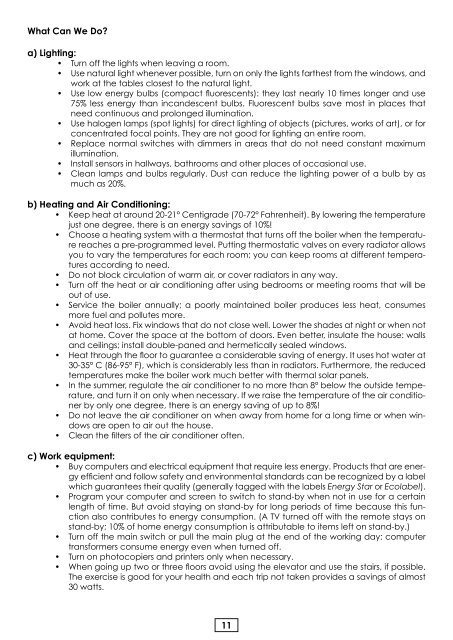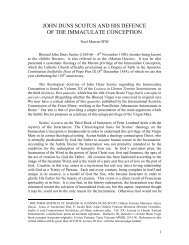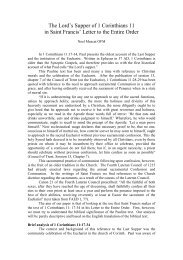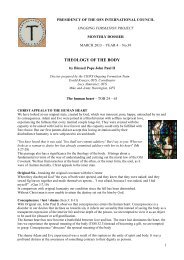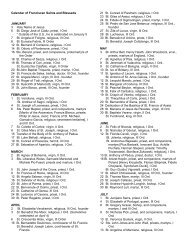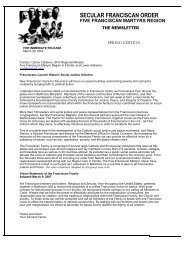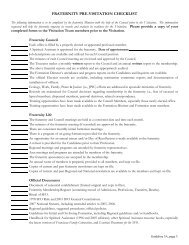Care for Creation in the Daily life of the friars Minor - OFM
Care for Creation in the Daily life of the friars Minor - OFM
Care for Creation in the Daily life of the friars Minor - OFM
You also want an ePaper? Increase the reach of your titles
YUMPU automatically turns print PDFs into web optimized ePapers that Google loves.
What Can We Do?<br />
a) Light<strong>in</strong>g:<br />
• Turn <strong>of</strong>f <strong>the</strong> lights when leav<strong>in</strong>g a room.<br />
• Use natural light whenever possible, turn on only <strong>the</strong> lights far<strong>the</strong>st from <strong>the</strong> w<strong>in</strong>dows, and<br />
work at <strong>the</strong> tables closest to <strong>the</strong> natural light.<br />
• Use low energy bulbs (compact fluorescents): <strong>the</strong>y last nearly 10 times longer and use<br />
75% less energy than <strong>in</strong>candescent bulbs. Fluorescent bulbs save most <strong>in</strong> places that<br />
need cont<strong>in</strong>uous and prolonged illum<strong>in</strong>ation.<br />
• Use halogen lamps (spot lights) <strong>for</strong> direct light<strong>in</strong>g <strong>of</strong> objects (pictures, works <strong>of</strong> art), or <strong>for</strong><br />
concentrated focal po<strong>in</strong>ts. They are not good <strong>for</strong> light<strong>in</strong>g an entire room.<br />
• Replace normal switches with dimmers <strong>in</strong> areas that do not need constant maximum<br />
illum<strong>in</strong>ation.<br />
• Install sensors <strong>in</strong> hallways, bathrooms and o<strong>the</strong>r places <strong>of</strong> occasional use.<br />
• Clean lamps and bulbs regularly. Dust can reduce <strong>the</strong> light<strong>in</strong>g power <strong>of</strong> a bulb by as<br />
much as 20%.<br />
b) Heat<strong>in</strong>g and Air Condition<strong>in</strong>g:<br />
• Keep heat at around 20-21° Centigrade (70-72° Fahrenheit). By lower<strong>in</strong>g <strong>the</strong> temperature<br />
just one degree, <strong>the</strong>re is an energy sav<strong>in</strong>gs <strong>of</strong> 10%!<br />
• Choose a heat<strong>in</strong>g system with a <strong>the</strong>rmostat that turns <strong>of</strong>f <strong>the</strong> boiler when <strong>the</strong> temperature<br />
reaches a pre-programmed level. Putt<strong>in</strong>g <strong>the</strong>rmostatic valves on every radiator allows<br />
you to vary <strong>the</strong> temperatures <strong>for</strong> each room; you can keep rooms at different temperatures<br />
accord<strong>in</strong>g to need.<br />
• Do not block circulation <strong>of</strong> warm air, or cover radiators <strong>in</strong> any way.<br />
• Turn <strong>of</strong>f <strong>the</strong> heat or air condition<strong>in</strong>g after us<strong>in</strong>g bedrooms or meet<strong>in</strong>g rooms that will be<br />
out <strong>of</strong> use.<br />
• Service <strong>the</strong> boiler annually; a poorly ma<strong>in</strong>ta<strong>in</strong>ed boiler produces less heat, consumes<br />
more fuel and pollutes more.<br />
• Avoid heat loss. Fix w<strong>in</strong>dows that do not close well. Lower <strong>the</strong> shades at night or when not<br />
at home. Cover <strong>the</strong> space at <strong>the</strong> bottom <strong>of</strong> doors. Even better, <strong>in</strong>sulate <strong>the</strong> house: walls<br />
and ceil<strong>in</strong>gs; <strong>in</strong>stall double-paned and hermetically sealed w<strong>in</strong>dows.<br />
• Heat through <strong>the</strong> floor to guarantee a considerable sav<strong>in</strong>g <strong>of</strong> energy. It uses hot water at<br />
30-35° C (86-95° F), which is considerably less than <strong>in</strong> radiators. Fur<strong>the</strong>rmore, <strong>the</strong> reduced<br />
temperatures make <strong>the</strong> boiler work much better with <strong>the</strong>rmal solar panels.<br />
• In <strong>the</strong> summer, regulate <strong>the</strong> air conditioner to no more than 8° below <strong>the</strong> outside temperature,<br />
and turn it on only when necessary. If we raise <strong>the</strong> temperature <strong>of</strong> <strong>the</strong> air conditioner<br />
by only one degree, <strong>the</strong>re is an energy sav<strong>in</strong>g <strong>of</strong> up to 8%!<br />
• Do not leave <strong>the</strong> air conditioner on when away from home <strong>for</strong> a long time or when w<strong>in</strong>dows<br />
are open to air out <strong>the</strong> house.<br />
• Clean <strong>the</strong> filters <strong>of</strong> <strong>the</strong> air conditioner <strong>of</strong>ten.<br />
c) Work equipment:<br />
• Buy computers and electrical equipment that require less energy. Products that are energy<br />
efficient and follow safety and environmental standards can be recognized by a label<br />
which guarantees <strong>the</strong>ir quality (generally tagged with <strong>the</strong> labels Energy Star or Ecolabel).<br />
• Program your computer and screen to switch to stand-by when not <strong>in</strong> use <strong>for</strong> a certa<strong>in</strong><br />
length <strong>of</strong> time. But avoid stay<strong>in</strong>g on stand-by <strong>for</strong> long periods <strong>of</strong> time because this function<br />
also contributes to energy consumption. (A TV turned <strong>of</strong>f with <strong>the</strong> remote stays on<br />
stand-by; 10% <strong>of</strong> home energy consumption is attributable to items left on stand-by.)<br />
• Turn <strong>of</strong>f <strong>the</strong> ma<strong>in</strong> switch or pull <strong>the</strong> ma<strong>in</strong> plug at <strong>the</strong> end <strong>of</strong> <strong>the</strong> work<strong>in</strong>g day: computer<br />
trans<strong>for</strong>mers consume energy even when turned <strong>of</strong>f.<br />
• Turn on photocopiers and pr<strong>in</strong>ters only when necessary.<br />
• When go<strong>in</strong>g up two or three floors avoid us<strong>in</strong>g <strong>the</strong> elevator and use <strong>the</strong> stairs, if possible.<br />
The exercise is good <strong>for</strong> your health and each trip not taken provides a sav<strong>in</strong>gs <strong>of</strong> almost<br />
30 watts.<br />
11


